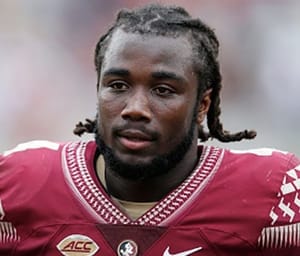Let’s Talk About Dalvin Cook, The NFL, And Off-Field Issues

Off-field issues are hard to parse in the NFL. Depending on the crimes players have (or haven’t) committed, the conversation usually devolves into whether or not the player “deserves” their dream of playing football at the highest level. Articles reporting on an off-field incident will invariably cite that player’s stats and accomplishments, to the discomfort of many. Crime and football have a complicated relationship. Considering the flurry of questionable characters to enter the league, including Caleb Brantley, Gareon Conley and most notably Joe Mixon, it’s hard to absolve the NFL of some degree of amnesty. When a football team drafts one of these players, to a degree, they’re forgiving or even condoning some pretty nasty stuff. Every situation is different – Joe Mixon has a video and Gareon Conley might not even be guilty, so let’s talk about the “questionable” guy the Vikings traded up to target, and couldn’t bear to see let go, Dalvin Cook.
We won’t talk about Cook’s on-field prowess here, turn to Matt Waldman for that. We’re going to talk about the decision making process of drafting a player with questionable (or outright deplorable) character. So what goes into it? It’s very easy if you’re the kind of person who equates drafting a player to amnesty for their crimes – it’s wrong, and you just don’t do it. Battery, assault, robbery- they’re not to be forgiven with a slap on the wrist. With that mentality, a player with a rap sheet doesn’t “deserve” the opportunity to play on the most grandiose stage in sports. While being shunned to the darkest corners of unemployment may be satisfactory to some, I can’t agree with it. It comes from a place of bloodlust and a warped sense of justice.
People do horrible things, and they deserve punishment for their crimes- this is the foundational principle for most modern societies. And while the justice system theoretically has this concept built into it, we often want sports leagues, companies and other private entities to follow suit, ostracizing the offending party for the rest of their lives. But those private entities do not have a cultural burden to levy punishment and judge the severity of crimes. That’s what the justice system is for, and however flawed it is, it’s equally irresponsible to expect private entities to behave with a set of morals that matches our own. So how can we possibly come to terms with a giant, often favorable light being shone onto players like Adrian Peterson or Tyreek Hill? It’s not like we have a means to stop it short of boycotting football altogether, and even that wouldn’t hold much significance.
The NFL, and more specifically its teams, have no legal obligation to levy punishment on a player who is already being punished by the U.S. justice system. But with the size of the NFL, its wide-reaching appeal and perpetuity of its spotlight, its has a cultural obligation to set a good example. We watch players and look up to them, our kids want to be just like them. Seeing a small child in a Joe Mixon jersey has an uncomfortable undertone. But the NFL can’t stop college athletes from getting into trouble, and banning them from the league before they even enter it is problematic in nature. While it satisfies our warped sense of justice, it misses an opportunity to send a message that redemption is possible. Think of a troubled (non-athlete) kid in a bad neighborhood or otherwise in trouble. Would it be better for society at large if that kid thought he was hopelessly condemned, or if he was shown a way to atone?
The NFL has a perfect opportunity to show that path to redemption. Michael Vick opened that door for the first time that social media like Twitter, Facebook and so on could cover it. Ray Rice, while he’s been ostracized, is taking the necessary steps to make a potential return to the league a triumphant victory for the good guys. This year’s draft picks all have the opportunity Rice never had. Should Mixon become an outspoken advocate for victims of domestic violence, should Conley (guilty or not) become a vocal supporter of rape survivors, and so on, they’d send the message that you can turn things around if you’ve messed up. Nobody will say that hitting a woman (or whatever crime) is right. But it’s worth giving kids a second chance not because they “deserve” it (a concept that’s impossible to draw parameters for), but because society at large benefits more when troubled kids can become a story of redemption.
it’s worth giving kids a second chance not because they “deserve” it, but because society at large benefits more when troubled kids can become a story of redemption.
Dalvin Cook’s past pales in comparison to Caleb Brantley or Joe Mixon’s transgressions. Cook was a troubled kid growing up in a rough part of central Florida, and got in plenty of trouble in high school. A wake-up call, detailed in that linked article, got him to set his act straight. Still, he hung out with the wrong crowd and ended up in some other sticky situations. For clarity, let’s list out Cook’s rap sheet:
- A 2009 robbery charge that was ultimately dropped
- A 2010 incident with firing a weapon on school grounds
- A 2014 BB gun related incident that resulted in broken car windows
- Listed as an “associate” in a 2014 aggravated assault incident with two other students who brandished a firearm at a neighbor.
- A 2014 incident where Cook mistreated puppies by chaining them up around the neck
- A 2015 charge of punching a woman in the face from which he was quickly acquitted by a jury
That’s a long list for a 21 year old kid. But these incidents, one by one, seem to be more about maturity and less about a chronic issue in attitude or character. The 2015 charge, upon further examination, is safe to ignore. The two charges from his middle school days were both dropped, and regardless, incidents from eight years ago hold little weight. His triple-threat of 2014 incidents can all be chalked up to stupidity and negligence, or in the case of the “association”, being near a crime someone else committed. Make no mistake, there’s no excuse for improperly tethering puppies or brandishing a firearm and causing damage. Cook made some immature decisions of his own volition, and while the people around him had an influence, that doesn’t absolve him of his minor crimes. That said, these crimes don’t have the cultural impact that Mixon or Brantley do, and therefore the NFL (and Vikings specifically) have no obligation to make a message out of them. At that point, it becomes a question of liability – can we trust Dalvin Cook to stay on the field? Regardless of your answer, that’s the only productive way we can approach this question.
Off-field issues, to NFL teams, are not moral conundrums. They can’t be. NFL teams aren’t legal or justice institutions. Instead, they have to think of these issues as risk factors. The positive outcome is that Cook (or whoever) stays out of trouble, becomes a positive contributor for his community and illuminates the path back from the brink of the criminal justice abyss. The negative outcome is that he gets back in trouble, and not only do you lose your draft investment, but you’ve now provided “amnesty” to someone who didn’t ultimately deserve it. So what sort of risk does Cook provide that made him fall a whole round below his perceived stock? His worth in the positive outcome is as a first rounder. His worth in the negative outcome is a big fat zero. Considering he only fell to the 2nd, and Rick Spielman still calling him too talented to pass up, you can safely say that Rick and the Vikings perceive Cook’s off-field problems as a minor risk. Not necessarily one with small ramifications, but one with a low probability of manifesting itself.
Still, off-field risk is not exactly a subject you can quantify, and thus, the argument will always be subjective. Whether you buy into the MMQB’s message, or this Matthew Coller think-piece on the subject, know what to root for. Joe Mixon or Gareon Conley becoming a role model for troubled kids, and providing a possible glimmer of hope for them to turn their lives around, is the best possible thing that can come from their entry into the NFL, and provides much more positivity than exile. The same goes for Dalvin Cook. While it’s easy to give in to bloodlust, we should hope that any situation adds more good to the world than tragedy.
Thanks for reading!
